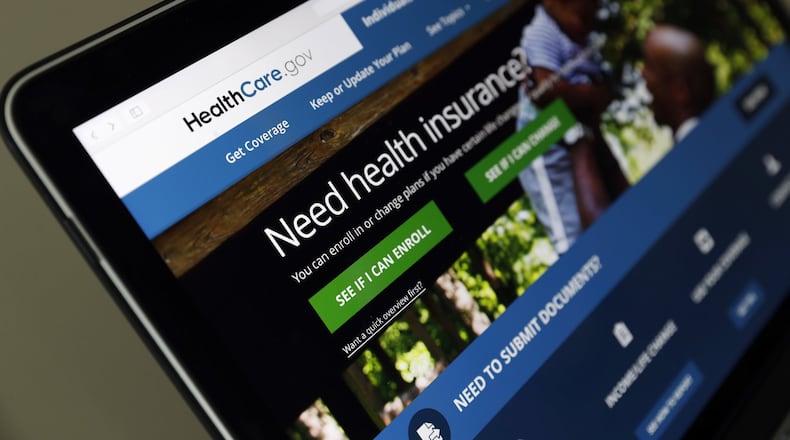Just as the Affordable Care Act seems in danger of being struck down in court, its market has stabilized in Georgia.
For the first time since the health insurance exchange bottomed out here — shedding companies, spiking premium rates and nearly leaving some counties without coverage — it's on track to add insurers to increase consumers' choices.
Two additional companies have filed preliminary plans to jump in, making for six companies that could offer health insurance on the Georgia ACA exchange, also known as Obamacare.
They can back out or change their plans until state and federal regulators give their final approval in the coming weeks, cautioned Steve Manders, the director of the product review division at the Georgia Department of Insurance.
“They’re starting to get more comfortable, and predictablility’s a little bit more sure on how they can set rates going forward,” Manders said.
The addition still doesn’t change the fact that plans are too expensive for many customers, especially those who don’t qualify for subsidies. That’s part of what made it stable, experts say: price increases, as high as 57% one year, that made the ACA business more profitable.
However, for the second year in a row, average premium rates are looking stable. The four companies currently on the market all filed applications to stay in Georgia’s ACA market next year. None of their preliminary rate proposals would raise premiums as much as current inflation in health care. Two would even lower their prices on average, one by 10.7%.
The price stability is even better than it looks, considering that health care prices generally are soaring, at about 10% inflation.
The cost changes, too, are subject to change until final approval.
“The more the better,” said Terry Turner, an Acworth insurance agent who sells health and other plans. “Competition’s the only thing that drives cost down and coverage up. We need companies on the market.”
One of the bigger impacts to customers, if the filings hold, is that one of the companies plans to offer plans in Turner's neck of the woods, Cobb County. That will bring to two the number of Cobb alternatives to Anthem, which this year summarily dropped the massive Cobb-based WellStar Health System from its network.
Turner said he doubted competition would force a change in Anthem itself — “They think they own the business, basically,” he said — but at least it gives people options.
From a high point in 2016, when nine companies offered plans, the Georgia exchange has lost more than half its players. Georgia’s exchange currently has four companies: Alliant; Ambetter; Anthem, formerly known as Blue Cross Blue Shield; and Kaiser Permanente. None of those companies covers the entire state, although every part of the state has at least one company. Many counties are only served by one insurer. Most of metro Atlanta is served by two.
Both of the new entrants would serve part of metro Atlanta, including Fulton County. The two expressing interest are Oscar Health, a New York-based company founded by Josh Kushner (brother of Jared Kushner, the son-in-law and aide to President Donald Trump), and Dayton, Ohio-based CareSource, a nonprofit insurer that also manages Medicaid and Medicare plans. Oscar has proposed to include Cobb.
In a written statement, Oscar emphasized that its decisions were not final. “We’re committed to expanding to several new markets in 2020,” wrote a spokesman, Ryan Towey. “However, we have not yet confirmed our markets for next year; entry into any market is still pending regulatory approval.”
CareSource, also in a statement, expressed enthusiasm. “CareSource has proudly served more than 200,000 Georgia Medicaid members since 2017,” Georgia market President Bobby Jones said. “We’re excited to expand our service offering for 2020 to include Marketplace.”
“The market has, in spite of the efforts of the (Trump) administration, has stabilized over the last few years,” said Bill Custer, a professor of health policy at Georgia State University. “And states including Georgia have moved to take action that would further stabilize the market.”
Custer was referring to one of two health care “waivers” that Gov. Brian Kemp’s administration may seek asking the Trump administration for flexibility in spending federal health care dollars. One of the two waivers could further help stabilize prices on the ACA exchange market, though Kemp has not settled on what he plans to propose.
The ACA exchange market, however, will always be vulnerable to attempts to undo it. The Trump administration has candidly taken actions that have undermined its stability, and insurance companies cited that uncertainty in raising their prices.
Right now, the biggest threat to the ACA is coming from states including Georgia. State Attorney General Chris Carr joined Georgia to 19 other states, now down to 17, challenging the law's constitutionality in federal court. The lawsuit once drew scoffs from legal experts, but federal appeals judges who heard arguments in July made it clear they're considering striking down the law. That decision would then be appealed to the U.S. Supreme Court.
Carr and other advocates for the lawsuit have said that if it succeeds in eliminating the health care law, they hope Congress will unite to reinstate the good parts.
GEORGIA’S MARKETPLACE
Four companies currently offer plans on Georgia’s Obamacare marketplace, and all have proposed to continue next year. These are their proposed price increases or decreases for 2020 so far, though they can change in the next few weeks. Health care prices generally are soaring, at about 10% inflation.
- Alliant — -10.2%
- Ambetter — -2.5%
- Blue Cross — +3.3%
- Kaiser — +4.5%
Two new companies have expressed interest in joining the Georgia market.
- CareSource of Dayton, Ohio
- Oscar Health of New York
Source: Georgia Department of Insurance
Stay on top of what’s happening in Georgia government and politics at www.ajc.com/politics.
About the Author





